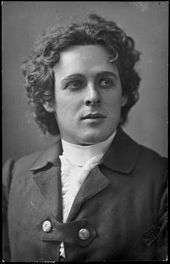Karl Gentner
Karl Friedrich Gentner (23 May 1876 – 13 September 1922) was a German operatic tenor.

Life
Gentner was born in Frankenthal as the son of the mechanic Karl Gentner (1845-1900) and his wife Luise née Messinger (1851-1930) in Frankenthal, then a Bavarian Rhine District. In 1899, the father had applied for a technical patent in the USA for a simple but efficient ground anchoring system for electric poles.
Gentner became a well-known opera singer. In 1905 he married the soprano Else Fischer (1883-1943),[1] who was later known as Else Gentner-Fischer, one of the most important dramatic soprano in Germany.
In 1906 the Frankfurt director Emil Claar appointed the singer couple to the Oper Frankfurt. While his wife remained employed there throughout her life, Gentner moved to the Deutsche Oper Berlin-Charlottenburg in 1914, where he was engaged until his death.[2]
After his death in Berlin at age 46, the singer's body was transferred to his birthplace and buried there in the family grave. The grave still exists today (as of 2012) at the main cemetery Frankenthal. His wife later married the baritone Benno Ziegler
At the premiere of Franz Schreker's opera Der ferne Klang, 1912 in Frankfurt, Gentner played and sang the leading role of Fritz.(Friedrich C. Heller (edit.):[3] (Publications of the Institute for Austrian Music Documentation. Volume 1). Schneider, Tutzing 1974, ISBN 3-7952-0151-9, p. 46 (Google Books | BuchID = yRtBAAAAMAAJ | page = 46 | emphasis = Gentner).</ref> The Austrian composer Alexander von Zemlinsky described Gentner as "a great talent".[4]
Further reading
- Walter Knögel: Karl Gentner, der bedeutende, aus Frankenthal stammende Operntenor. In Frankenthal einst und jetzt, 1963, pp. 16–18.
External links
| Wikimedia Commons has media related to Karl Gentner. |
References
- Karl-Josef Kutsch, Leo Riemens: Everlasting voices. Francke, Berlin 1975, ISBN 3-7720-1555-7, p. 255 (Karl Gentner, p. 255, at Google Books).
- Horst Weber: Zemlinsky's correspondence with Schönberg, Webern, Berg and Schreker (Correspondence of the Vienna School. Volume 1). Wissenschaftliche Buchgesellschaft, Darmstadt 1995, ISBN 3-534-12508-8, p. 363 (Google Books) | BuchID = ORgIAQAAMAAJ | page = 363 | emphasis = "Gentner, Karl"}}).
- Arnold Schönberg, Franz Schreker. Correspondence on WorldCat
- Horst Weber: Zemlinsky's correspondence with Schönberg, Webern, Berg and Schreker (Correspondence of the Viennese School. Volume 1). Wissenschaftliche Buchgesellschaft, Darmstadt 1995, ISBN 3-534-12508-8, p. 334 (Karl Gentner at Google Books | BuchID = ORgIAQAAMAAJ | page = 334 | emphasis = Gentner Charlottenburg).